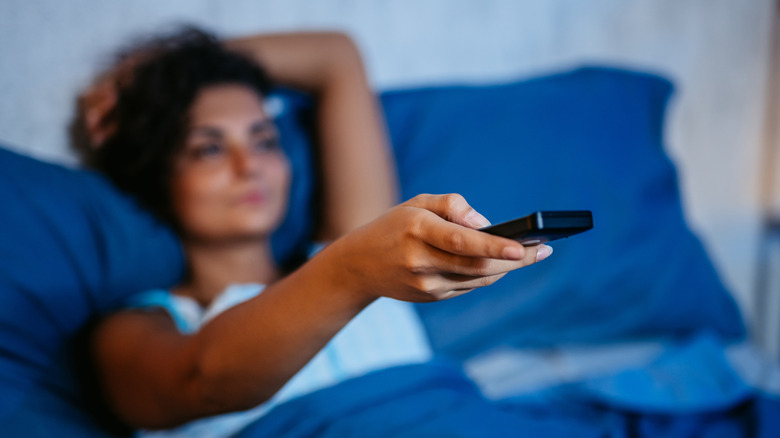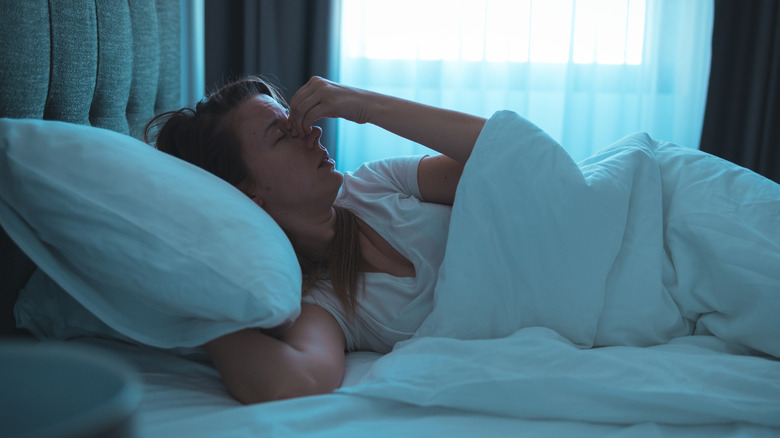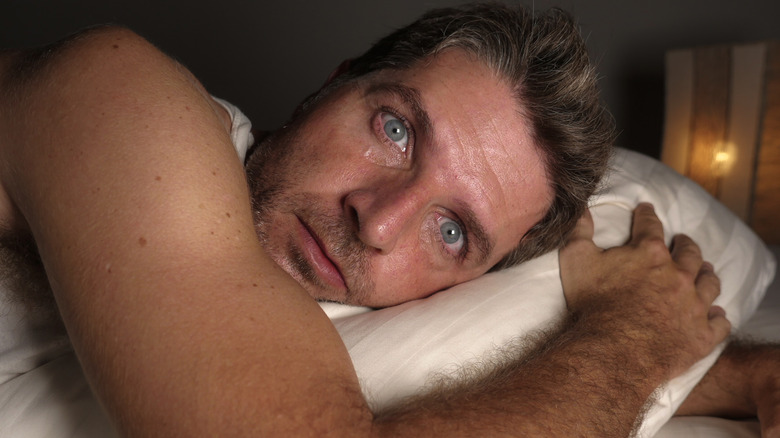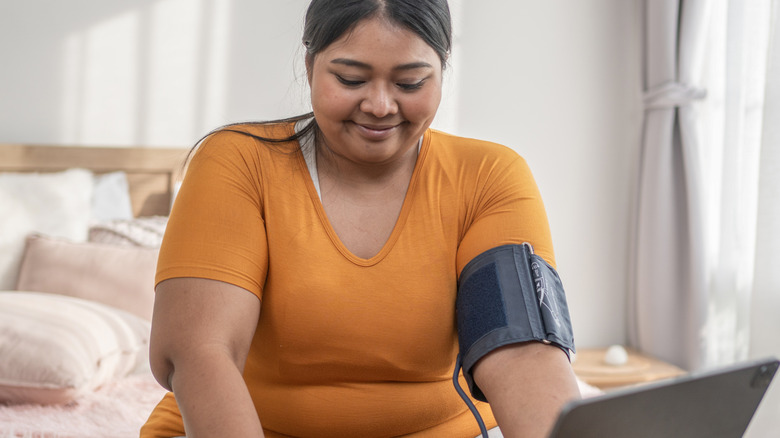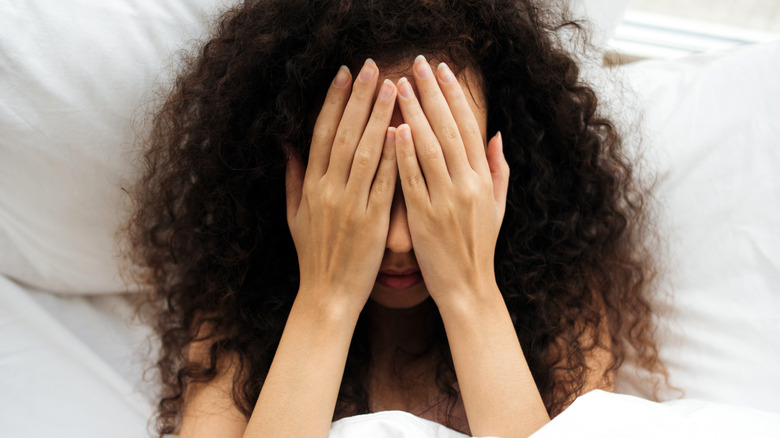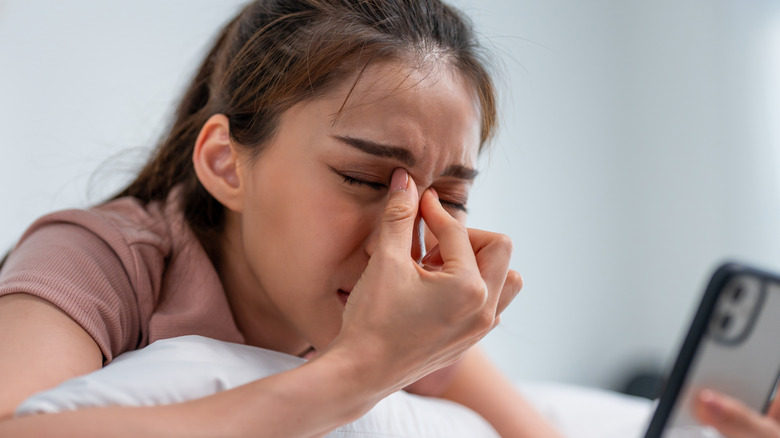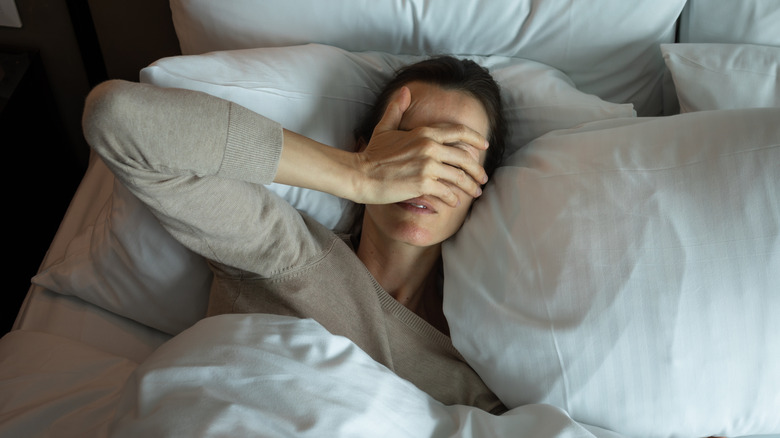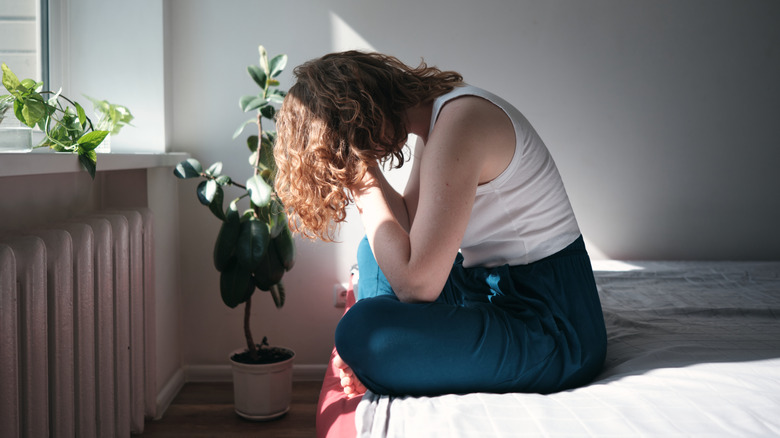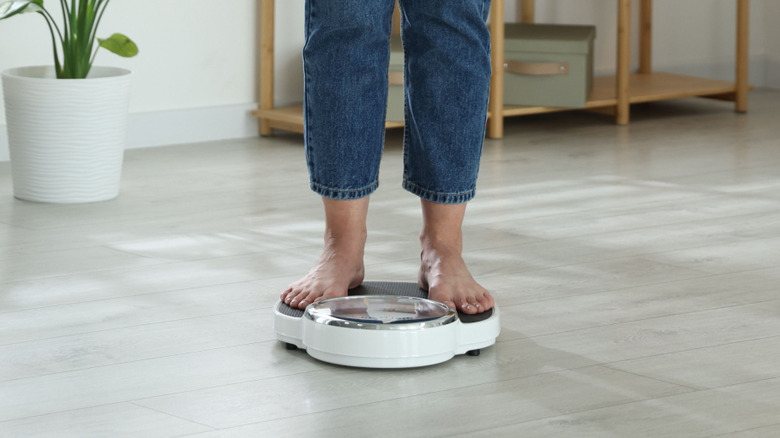What Happens To You Body When You Watch A Movie Before Bed
At the end of a long day, it's very common for people to crawl under the covers, grab the remote, and start bingeing their favorite shows or movies as a way to unwind. In fact, the Sleep Foundation found that TV watching before bed is the number one bedtime ritual for adults. More people use the tube to unwind than a warm shower or even conversing with their partner. On top of that, more than 70% of people polled said that it's more of a habit than anything else.
Unfortunately, this very popular means of unwinding could be having some damaging effects. According to a survey conducted by the American Academy of Sleep Medicine, 88% of adults in the U.S. reported having issues with sleep due to staying up watching TV. This loss of sleep led to feelings of frustration, guilt, and worry and had negative consequences that often impacted people into the following day. If you're considering catching up on a favorite flick before bed, you may want to think about what the physical fallout might be.
Melatonin production is supressed
Your body works on a particular rhythm. When you wake up, your system is flooded with cortisol, a hormone that helps you wake up. Then, when night comes on, melatonin, a sleep-producing hormone, is released (via the Sleep Foundation). Devices like phones, tablets, e-readers, and televisions emit blue light, a type of light that can disrupt that natural sleep rhythm. Exposure at night can slow the production of melatonin, making it harder for you to wind down. It can also reduce deep sleep and REM sleep that your brain needs to be fully rested and alert the next day.
All light can interfere with melatonin, but blue light is particularly disruptive, according to Harvard Medical School. In a Harvard study, people exposed to blue light for six and a half hours had their melatonin production suppressed twice as long as those exposed to green light of similar brightness. It also shifted their internal clocks by about three hours, which was double the effect of green light.
Your brain stays in alert mode
Sleeping with the TV on keeps your brain active as you focus on the dialogue and situations unfolding onscreen. As a result, your brain can't quiet down and enter into a more restful state for sleep. Additionally, if you do fall asleep, your overstimulated brain may keep you from sinking into the restful deep sleep that your body needs. As you're sleeping while the movie is still playing, sudden jump scares, explosions, or loud, shouted dialogue can cause you to wake up suddenly, disrupting your sleep and keeping you from getting rest.
Essentially, watching a show or movie before bed can flood your senses, scatter your attention, and overall make it difficult, if not impossible, for your brain to power down. This can have long-term effects stretching into the next day. When your brain is depleted and deprived of rest, it becomes harder to focus, and even small tasks can feel like too much to take on. As a result, you can begin to feel irritable or angry. If you are looking for a way to wind down in bed before sleep, it might be best to put down the remote and pick up a book instead.
Heart rate and blood pressure may spike
Mount Sinai reports that the toll poor sleep can take on your body can amount to more than just feeling tired the next day. Lack of sleep has been linked to higher blood pressure, weight gain, increased blood sugar, and chronic inflammation. All of these factors raise the risk of heart problems. Additionally, inflammation in artery walls can trigger the blood clots responsible for most heart attacks.
A 2023 review published in the Journal of Health, Population and Nutrition found that kids and teenagers who spent the most time in front of screens had an 8% greater chance of developing hypertension. On top of that, children and teens with high blood pressure tended to spend nearly 50 minutes per day on screens compared to their peers who had normal blood pressure. The findings suggest that more time spent on devices like TVs, phones, and computers may contribute to long-term heart health risks for young people.
You could have nightmares
What you watch before bed may not just keep you awake; it could also follow you into sleep. A 2016 study published in Dreaming showed that people who watched violent films and TV shows or consumed other types of violent media (such as video games) before bed were 13 times more likely to have a nightmare than people who chose lighter entertainment or no entertainment at all. The study also showed that people who consume sexual content before bed are also six times more likely to have sex-related dreams. The study posited that these images have the ability to trigger similar thoughts and images in our brains as we sleep.
Additionally, a 2024 study published in Brain Sciences showed that emotionally intense content, such as violent or overly sexual material in TV and movies, can influence the tone and content of our dreams. The study found that people who viewed emotionally arousing material before bed were more likely to report dreams that were hostile, anxious, or emotionally charged. The study lends further credence to the idea that consuming even what may be harmless entertainment before bed may be having more of an impact on your subconscious than you think.
Eye strain can develop
Excessive screen time from TVs and even phones, laptops, and tablets can trigger sharp eye pain, headaches, and tiredness of the eyes. Watching a bright screen in a dark room, especially at night, makes things worse. Your irises naturally dilate to take in the darkness, but they don't adjust well to the bright light of a screen, leading to added discomfort and potential long-term strain on the eyes.
In a 2006 study conducted by the Lighting Research Center, participants were asked to view a movie for one hour in a room where the screen wasn't the sole source of light. Then, for the second hour of the movie, the TV was the only light source. Researchers found that watching screens with some extra lighting in the room was easier on the eyes versus watching in complete darkness. Having another source of light helped to reduce temporary eye strain, fatigue, and discomfort.
Your sleep-wake cycle can be affected
Your body runs on a built-in clock known as the circadian rhythm, which helps keep your sleep-wake cycle regulated. This rhythm is tied in closely to natural signals such as sunlight and darkness, which tell your brain when to feel alert and when to prepare to rest. But when you stay up late staring at a screen, those bright lights end up sending the wrong message. Your brain can actually be tricked into thinking it's daytime, making it harder to fall asleep and stay asleep.
This throwing off of the body's internal clock can lead to a condition known as "social jet lag," according to Tom's Guide. This happens when you spend too much of your weekdays and weeknights awake and then attempt to make up the difference over the weekend. This misalignment can impact everything from cognitive function to memory and mood. To combat this, it's best to keep a consistent bedtime, even on the weekends, and turn off screens before you hit the pillow.
You may snack more
Whether on the couch or in bed, there is a definite link between watching TV and overeating. Cleveland Clinic reports that, while watching TV, you tend to be more focused on what's happening onscreen and less on the snacks that are in front of you. This could also cause you to not realize when you've had enough, which could lead to overeating. Additionally, the length of whatever you're watching could be a factor, given your distracted state. If a movie is two hours long — and if you're not paying attention — it's entirely possible that you could find yourself snacking for the duration of the film.
Additionally, eating while watching TV may have some long-term implications as well. According to a 2025 study published in Nutrients, watching TV didn't always lead to overeating, but it did make people more likely to eat more later on. The distraction of television may interfere with how full you feel or how well you remember what you've eaten, which could lead to you eating more at your next meal.
Your emotions could be affected
Sleep is a big factor in helping us to regulate and manage our emotions. If we get enough rest, our brains are allowed to process our emotions and clear the board for the next day. Too much screen time before bed, such as watching TV or movies later in the evening, can elevate stress and make it harder for people, especially teenagers, to unwind. This heightened emotional sensitivity can linger into the next day, making it difficult to focus or manage emotions effectively.
Viewing programs filled with violence, disaster, or trauma activates the brain's fear center, known as the amygdala, and triggers stress responses that linger even after the show ends. A cognitive shortcut known as the availability heuristic can lead people to believe that these types of threats are more common than they are. As a result, a sense of unease can carry over into bedtime, making it harder to calm down, regulate emotions, and get a restful night's sleep.
Your weight can go up
Even if you're not snacking, falling asleep with the TV on could still impact your weight. A 2019 study published in JAMA Internal Medicine showed that women who slept with a light or the television on were 17% more likely to gain 11 pounds or more and to develop obesity over time. These findings held true even after taking into account such factors as diet, exercise, and sleep quality.
These findings were supported by a 2020 review published in Environmental Research. That review showed that artificial light at night can impact everything from sleep patterns to hormone production and metabolism. Additionally, the Sleep Foundation notes that sleep deprivation can impact the production of the hormones that control our appetites. Leptin is a hormone that impedes hunger, while ghrelin sends hunger signals through the body. An imbalance of these hormones due to poor sleep can lead to a higher intake of calories during the day.
